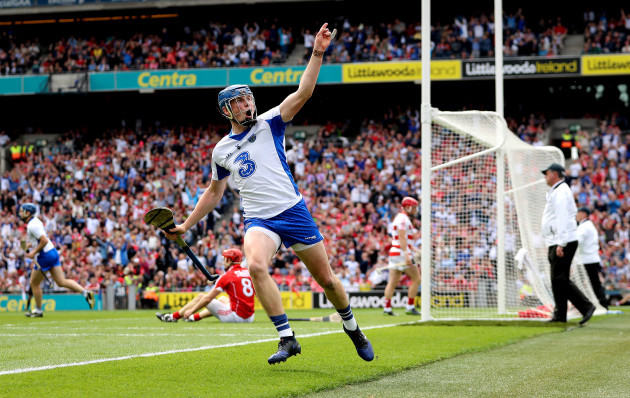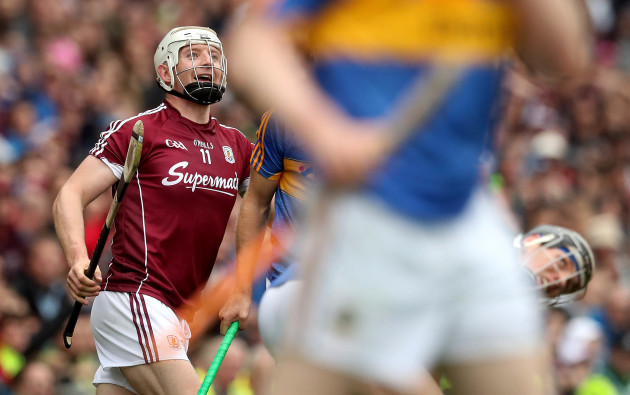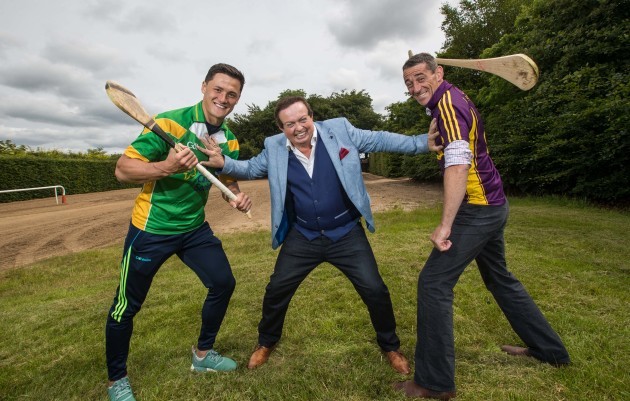“LISTEN TO THE noise, listen to the heartbeat of the people of Ireland! All Ireland hurling final day should be, in my humble opinion, a national holiday!”
Never mind trying to figure out whether it’s Galway or Waterford who’ll be swigging from Liam McCarthy come Sunday evening. There’s only one big question ahead of All-Ireland hurling final day:
How on earth will Marty Morrissey top last year?
Remember? The epic opening monologue to Tipperary v Kilkenny that was less radio commentary, more call to prayer? A serenade around the world to wherever Irish ears sought the sound and sensation of hurling final day; Marty straining on the reins to keep just the right side of mawkish self-indulgence, delivering a bravura, tear-jerking piece of patriotic rhetoric.
“If you’ve had to leave home because of unemployment, or you just wanted to see the world, don’t feel left out,” exclaimed Marty last year, “because you are with us in spirit and in mind. We are thinking of you, we are Irish and we are family.”
Other than introducing Fionn MacCumhaill as his co-commentator, it’s hard to see where he goes next.
One minor quibble, though. Those ”walking on Fifth Avenue in New York or jogging around the Corniche in Abu Dhabi” were hearing the heartbeat, alas, of just some of the people of Ireland — the ones south of that famous line between Dublin and Galway which divides where hurling is played and, for the most part, not played.
The42 Podcasts / SoundCloud
And as one of the wildlings from north of that imaginary wall, it is on this week of all weeks that we feel most left out.
Many counties are unlikely to ever to experience the buildup to an All-Ireland final — the frenzied search for tickets, the terrible songs, the livestock dyed in county colours. But in the case of football most can at least dream of overcoming lack of population or organisational incompetence to lift Sam Maguire.
When it comes to hurling though, we are prisoners of geography, destined never to feel first hand the magic that had Marty waxing so lyrical.
This exclusion is made all the more terrible because, despite our obvious ignorance of the intricacies of the ancient game, it is plain to see that hurling is one of the best things that we do as a nation.
Hurling may well be that rare example of folk culture that is actually, objectively good. Bulgarian line dancing, Bolivian nose flute, the Japanese Way of Tea — these are all worthy examples of indigenous cultural activities; but can any rival hurling for the combination of tradition, passion and skill? Have 82,000 people ever turned up to hear the pan pipes?
So how strange that Sunday evening will mark the last experience of the game for so many in Ireland — save for a chance glimpse of a club match on TG4 — until well into 2018.
Hurling’s weird north/south divide goes way back into the ancient, knotted rings of our social past. Stick and ball games were traditional to both sides of the island. In the north the game was known as ‘camán’, or ‘commons’, a winter game which bore a close resemblance to modern shinty, with handling of the ball not allowed.
In the south ‘iomán’ was more like hurling as we know it, and was patronised by the landed gentry who organised matches as part of lusty, bucolic festivals of country life.
The changing political climate of the nineteenth century robbed hurling of its structures and social position, and the devastation wreaked by the Famine seemed set to kill it off altogether. Enter Michael Cusack, whose childhood spent in Co. Clare meant that when it came to reviving the great national pastime, it was iomán and not camán that was the chosen form.
And here we are. Growing up in Donegal was to never hold a hurl in one’s hand, which made former GAA President Liam O’Neill’s wish to ”put a hurl in the hand of every child” pretty resonant. The GAA have organised competitions like the Táin Leagues and the Celtic Challenge, which aim to give young hurlers in off-Broadway locations regular exposure to bright lights and better standards, and provincial councils and county boards have put in place development plans aplenty.
But it’s hard going. For most clubs and counties the pursuit of success in football is so all-consuming that the idea of turning valuable resources and attentions to another sport seems pointless. For example, Donegal’s 2009 five-year strategic plan hoped to “establish and sustain” hurling in four new clubs to add to the seven competing in the county. But last year just six clubs contested the senior hurling championship.
And Donegal is far from the weakest. Tyrone boasts just five senior clubs, Longford three and Fermanagh have one. Cavan meanwhile absented themselves from inter-county hurling for six years before making a return earlier this season.
CSO figures released in 2015 showed that just 1.9% of those who participated in physical activity chose hurling or camogie as their main sport, compared with 4.3% for Gaelic football and 7.7% for soccer. The figures break down as you might expect by age group and region, but in the border counties, the statistics didn’t register for hurling at all, as if it literally didn’t exist. The heartbeat of the nation, it seems, is rather faint in places.
Croke Park’s hope that global TV deals might sell the games across the world seems a little forlorn when they can’t even spread hurling north of Mullingar. And one wonders about the GPA playing exhibition matches in Boston rather than Belfast or Ballina. Barring a massive investment from the GAA – on the scale that helped make south county Dublin an unlikely hurling powerhouse – it seems that most counties will remain prisoners of geography and history, lacking the will and the resources to change the unfortunate lie of the land.
But as we tune in to Sunday’s extravaganza, doesn’t it seem wrong that the best thing we do as a nation is something many never get to do at all? That our greatest sporting day bypasses so many?
So maybe that could be the theme of Marty’s pre-match address. “If you’re listening in the streets of Derry or on the stony grey soil of Monaghan, if you’re in the shade of Ben Bulben or dining out in Dundalk: don’t feel left out, after all, this is the ALL-Ireland hurling final…”
Subscribe to The42 podcasts here:



